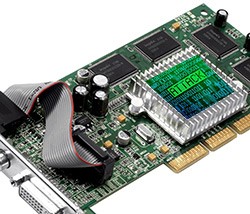WIN_JELLY GPU Malware Acts As Potentially Emerging Remote Access Tool or Trojan Threat
 There was a time that pre-installed software was the innovative thing to garnish the attention of those new to the world of personal computers. With that time far in the review mirror dating back to over 20 years ago, developers are finding that GPU Malware is on the rise and is acting as a dangerous Remote Access Tool or Trojan horse infection that could threaten Windows PCs and even Mac computers.
There was a time that pre-installed software was the innovative thing to garnish the attention of those new to the world of personal computers. With that time far in the review mirror dating back to over 20 years ago, developers are finding that GPU Malware is on the rise and is acting as a dangerous Remote Access Tool or Trojan horse infection that could threaten Windows PCs and even Mac computers.
GPU software can be thought of embedded information on a chipset of a Graphics Processing Unit, or simply put, the graphics/video card of your computer. In some instances, the chipset of the GPU resides directly on the motherboard of some systems, which could lead to the same issue where a GPU Malware threat identified as WIN_JELLY is acting as a RAT or Trojan threat giving attackers control of the infected system.
WIN_JELLY was recently discovered by security experts where the malware is thought to have been the result of anonymous developers who developed a Linux rootkit that runs on graphics cards in creating a proof-of-concept malware program. The developers are simply attempting to raise awareness that the malware can infect GPUs, and current security measures are not able to combat or resolve the GPU malware issues.
What was originally intended to be a demonstration, the WIN_JELLY malware may give remote attackers and user's access over an infected computer. Though, the specific features and details of WIN_JELLY are still unknown, one thing we can all conclude is that it has some form of remote capabilities to gain control of the infected Windows PC in some form.
The concept of running malware on graphics cards is not a new endeavor for hackers. Some of the findings of GPU malware dates back to 2013 when researchers at Columbia University of New York and the Foundation for Researcher and Technology Halls in Greece developed a keylogger that was assisted by a GPU. The GPU malware development at the time was all part of an academic project.
Anti-malware software on the current Windows PC market is not designed to detect threats or look for them in locations like the GPU. The use of GPU malware may be a new level or aggressive threats that bypass the detection agents of current security software, which leads us to think that we could be setting on the cusp of a serious pandemic if GPU malware ever breaks out as a widely-spread issue.
What is known about current GPU rootkit malware, is that it requires an AMD or NVIDIA dedicated graphics card and the OpenCL drivers. Use of the OpenCL (Open Computing Language) framework to execute code on GPUs may give a way for security researchers to develop and attack such malware found on GPUs.
Fortunately, teams are already working overtime to conjure up a JellyScan tool that gives system admins the ability to detect GPU-based malware. Additionally, it seems Mac OS X systems could be on the radar screen for those welding GPU malware on similar chipsets that use OpenCL, which Mac OS X systems come pre-installed with. The JellyScan tool may come in handy on a much larger spectrum in the near future.